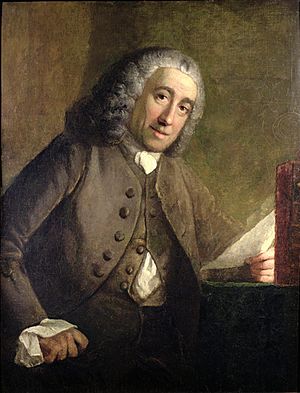Francis Fauquier facts for kids
Quick facts for kids
Francis Fauquier
|
|
|---|---|

Portrait of Francis Fauquier 1757
|
|
| Lieutenant Governor of Virginia Colony | |
| In office 1758–1768 |
|
| Governor | |
| Preceded by | Robert Dinwiddie |
| Succeeded by | Norborne Berkeley, 4th Baron Botetourt |
| Personal details | |
| Born | 1703 England |
| Died | 3 March 1768 Virginia, U.S. |
Francis Fauquier (1703 – 3 March 1768) was an important leader in the Colony of Virginia. This area is now part of the United States. He served as the lieutenant governor and acting governor from 1758 until he passed away in 1768. He was married to Catherine Dalston.
Fauquier was a respected teacher and a close friend of Thomas Jefferson. Jefferson later became a U.S. President. When Jefferson was a student at The College of William & Mary, Fauquier often hosted fancy parties. Jefferson would play his violin at these events. Fauquier County in Northern Virginia is named after him. Also, a building and a secret club at the College of William & Mary are named in his honor. This shows his strong connection to the college.
About Francis Fauquier
Francis Fauquier was born in England. His father, Dr. John Francis Fauquier, was a French Huguenot. Huguenots were French Protestants who faced challenges for their beliefs. His father moved to Britain. There, he worked as a financial expert. He was also a deputy master of the mint, working under the famous scientist Sir Isaac Newton. Later, Dr. Fauquier became a director of the Bank of England. He left his son a large amount of money.
Like his father, Francis Fauquier was a very well-rounded person. He had skills in science and business. He also loved the arts and helping others. In 1751, he became a director of the South Sea Company. This was a British trading company. In the same year, he became a governor of the Foundling Hospital. This charity helped abandoned children. In 1753, he was chosen as a Fellow of the Royal Society. This is a group for top scientists.
He arrived in the Virginia colony in 1758. He became the lieutenant governor, taking over from Robert Dinwiddie. He stayed in this role until his death.
His Role as Governor
Francis Fauquier was the main leader in Virginia when the official governors were away. These governors were the Earl of Loudoun (1756–63) and Jeffery Amherst (1763–68). He was told to remove the job of treasurer from the Speaker of the House of Burgesses. The House of Burgesses was Virginia's elected assembly. But he did not follow these orders. Instead, he became good friends with the House of Burgesses.
In 1759, he asked Andrew Burnaby to write about the state of the colonies. In 1760, he told the British government that colonists were starting to oppose British rules. He suggested that Britain should change its tax policies. However, in 1765, he closed the House of Burgesses. This happened when they passed a resolution against the Stamp Act. The Stamp Act was a new British tax on printed materials. Patrick Henry, a strong speaker, often challenged Fauquier. Fauquier called Henry "young and hotheaded."
Even though he fought against disloyalty, Fauquier understood the colonists. He was one of the most skilled and well-liked royal governors. Fauquier passed away in Virginia in 1768 when he was 65 years old.
A student dorm at the College of William and Mary is named after Fauquier.
His Ideas and Writings
- An Essay on Ways and Means for Raising Money for the Support of the Present War, without Increasing the Public Debts (1756): Fauquier wrote this essay during the Seven Years' War with France. This war was very expensive. He argued that the government could not pay for the war by taxing workers or factories more. Instead, he suggested taxing houses. In a later version, he also suggested a "capitation tax." This was a tax based on a person's wealth and what they bought.
 | Victor J. Glover |
 | Yvonne Cagle |
 | Jeanette Epps |
 | Bernard A. Harris Jr. |

